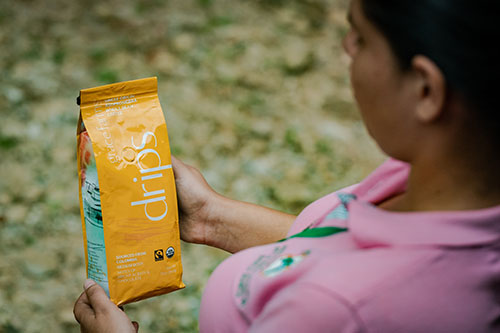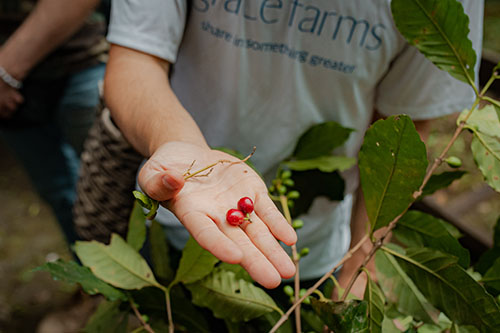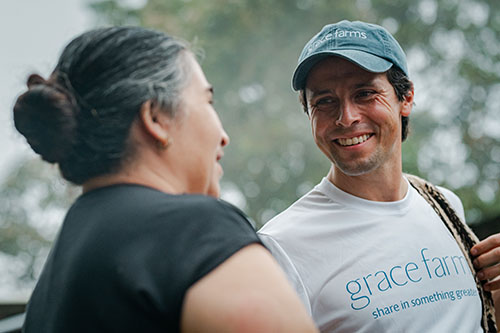What if you learned that there was forced labor behind the cup of coffee you made this morning — would you still make that same cup of coffee tomorrow?
Perhaps you learn that there is a way to fuel your body while protecting someone else’s. Would that have an impact on the coffee you choose to drink?
These are the questions that Grace Farms Foundation asks and aims to answer to end modern slavery and gender-based violence and create more grace and peace in both the local and global communities.
To help support Grace Farms Foundation’s humanitarian mission, Grace Farms Foods, a public benefit corporation, was created. Grace Farms Foods gives back 100% of its profits to Grace Farms Foundation’s Design For Freedom movement, which aims to eradicate forced labor in the built environment and create a more humane future.
This past July, Grace Farms Foods Co-Founder Adam Thatcher traveled to Colombia where he visited a Fairtrade co-op that provides coffee for Grace Farms Foods Drips line. The purpose of his trip to Colombia was to meet and foster relationships with the coffee farmers and suppliers and to conduct first-party audits to ensure that there is no forced labor behind the coffee that Grace Farms Foods sells.
Below is a Q&A with Adam Thatcher, as he wanted to share his experience and knowledge from his recent Colombia trip with the community.
A Q&A with Adam Thatcher, CEO of Grace Farms Foods:
What is the history behind the Grace Farms Foods ‘Drips’ line?

It was an honor to get to share the final product, Grace Farms Foods’ Drips coffee with the Asoprosierra co-op.
Adam: Before opening Grace Farms, Joe Apuzzo, owner of a coffee importing and roasting company, generously offered to provide coffee for Grace Farms Foundation to serve in the Commons and sell to visitors. Sharon Prince, Grace Farms Foundation’s Founder and CEO had two requests for a blend that would be special to Grace Farms: that the coffee be sustainable and if possible, that it come from women-owned farms.
Joe challenged his team of coffee professionals, who have over a hundred years of combined experience, to develop the best blend they could conceive of. The result was our signature coffee blend, River Roast.
River Roast became an instant hit at Grace Farms with visitors asking us to ship them bags of the delicious beans all over the country. It was this demand that inspired us share our signature coffee and teas with everyone and the Drips line of coffee was created. Today we not only offer Grace Farms’ signature River Roast, but we also offer two Single Origin coffees sourced from our Colombian and Indonesian farmers and partners.
Adam: We are committed to sourcing the highest quality coffee that doesn’t come at an extra cost to our planet or the farmers that grow the beans. That’s why we are incredibly particular about where and from whom we source our coffees from. For Grace Farms, sustainable coffee begins with organic farming practices that prioritize biodynamic and regenerative tactics like agroforestry and inter-crop plantings.

Adam holds a coffee cherry in his hand. The cherry is the actual fruit of the coffee plant and the coffee bean is inside.
We also know that it is farmers at the beginning of the supply chain that are most at risk of forced labor. That’s why we source from small-holder farmers whose average farms are less than 2.5 acres. By supporting small farmers and co-ops we help provide financial independence directly to the farms rather than large coffee plantations. Both our Indonesian and Colombian co-op partners are organic and Fairtrade certified and we are working with our Ethiopian supplier to become certified as well. We are excited to share that our Ethiopian partners recently received their organic certification as well.
How did you identify which suppliers or co-ops to use?
Adam: We have been very lucky to work with great partners here in the United States that are aligned with the same values as us. We work with partners who have a very wide network of tea and coffee suppliers but specialize in organic and fair trade sourcing. These partners are committed to helping us find the very best coffee and tea producers that they can personally recommend and vouch for.

The trip included visits to see some of the farms where the coffee is sourced from and to meet with the Asoprosierra co-op and the Colombian Coffee Federation.
We then sample the product to make sure it meets our high quality standards. Now that COVID-related travel restrictions have lifted, we have begun meeting with our suppliers to build a relationship with the farmers, and managers, and conduct our own first-party audits. These first-party audits are important because we get to see with our own eyes the sustainable farming practices. We get to speak directly with the farmers to ask them about working conditions and hear from them directly.
What are some of the challenges you have encountered with sustainable and ethical coffee sourcing?
Adam: The biggest challenge you encounter when trying to source sustainable and ethical products is identifying providers that meet your criteria. As mentioned, we are looking for organic ingredients that ideally also have FLOCERT (Fair Labor Organization Certification) and Fairtrade certification. Then we want to make sure the quality of the product is exceptional. These three rigorous standards make our options very small in the world of coffee and tea sourcing.
Was there an experience you had or a person you met while in Colombia that was reflective of the work and values of Grace Farms Foods?
Adam: We met with Emerita, a farmer and entrepreneur who grows coffee for the Asoprosierra co-op. She opened her home to us and showed us her farm. Emerita introduced us to her family and we played soccer with her grandson (one of 12), Samuel. We were surprised and honored when we found out that we were the first company to visit the co-op and its farmers.
Emerita was so welcoming and shared with us her story and of course her coffee. She talked about being a single mother who has worked hard to care for the land she farms and care for her family at the same time. She is a true entrepreneur who not only is a farmer, but also dedicates time and space for others. For instance, she opened an extra room that she rents to tourists who come to the mountains for eco-tourism. She also cooks food and lets bird watchers onto her farm, as where she lives is known for its thousands of rare bird species. When we left her home, she welcomed us back and even invited us to stay with her next time.

Adam met with Emerita, one of the small-holder farmers that grows the organic coffee found in the River Roast and Single Origin Asoprosierra coffees.
While Colombia and India are nearly 10,000 miles apart, are there any similarities in the people and cultures that you noticed from your recent travels?
Adam: The first and most noticeable similarity is the sense of hospitality that we experienced in both Colombia and India. No matter where we went and who we met, we were graciously welcomed with a smile and a cup of coffee or tea. These kind, yet simple gestures were the beginning of what would become smiles, story-telling, and hugs.
The second is how engrained tea is in the culture of India and coffee is in Colombia. Tea and coffee are not only important economic industries but also a way of life. Generations have built their livelihoods, raised their families, and shaped their traditions around tea and coffee respectively.
Lastly, and most importantly is the sense of hope we experienced in both Colombia and India. India is a very diverse country with a complicated social hierarchy and significant poverty. Colombia is a beautiful country that has been plagued by violence for centuries. Despite these challenges, the people of both India and Colombia are hopeful for a sustainable future for the next generation and are excited to feel connected to a mission and place like Grace Farms.
In what ways are you hoping to expand the Grace Farms Foods ‘Drips’ line? What do you see for the future?
Adam: Right now we aren’t focused on expanding the ‘Drips’ line, but rather focusing on how we can better support the partners we already have. Our most recent trip to Colombia was a very inspiring one and will be the first of many. We met with farmers and the founder of the Asoprosierra co-op who told us we were the first people to ever come visit them in Colombia. They were incredibly moved and we felt the same way. We want to support the communities we source from and help grow the co-ops we already partner with. That doesn’t mean we aren’t open to finding another special women-led co-op in the future.
We are excited to soon be offering our coffee in both whole bean and ground though which I know will excite a lot of people who don’t have a coffee grinder!

